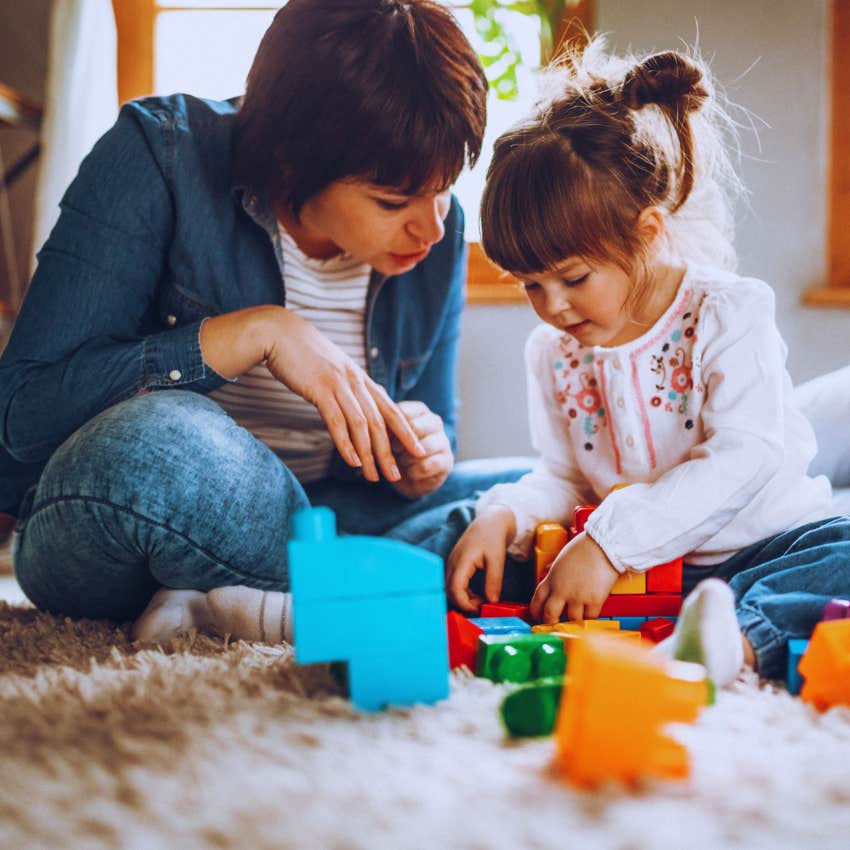Try This Mental Hack To Stay Cool & Calm When Your Child Gets Out Of Control
When you child is having a tantrum, it's tempting to have one yourself. A therapist explains how to get yourself under control.
 Peopleimages.com / YuriArcurs
Peopleimages.com / YuriArcurs Do you ever feel yourself losing control when your kids get a bit too rowdy? Or find yourself snapping over small disruptions at home?
Keeping your cool during these moments can be tough — but it's not impossible! Eli Harwood, an attachment therapist, gives us an incredible tip to help you stay calm and collected when your children are out of control.
The Mental Hack That Will Help You Stay In Control When Your Children Get Out Of Control
In order to stay as calm as possible when her children are not, Harwood says, "I regularly remind myself that parenting is its own developmental stage, that I am developing and being raised as much as my children are developing and being raised."
When your children become dysregulated, it's crucial to examine your reactions. Harwood states, "The level of maturity I show in response to my children’s reactions, emotions, and behaviors is a signal to me of what I may need to grow in.”
Your children aren't the only ones growing in their developmental stages. As parents, we slowly begin to change and mature as we gain more experience.
However, if we ignore our negative emotional reactions, we limit our potential to thrive as parents.
As you grow, you may begin to realize how your emotional reactions stem from past childhood trauma. According to the Institute For Advanced Psychiatry, “More than two-thirds of children report at least one traumatic event by the age of 16.”
Apart from abuse or bullying, other signs of childhood trauma can include:
- Watching domestic violence
- Natural disasters
- Losing a loved one
- Neglect
- Community or school violence
- Serious illness or accident
Childhood trauma causes us to develop mental disorders such as depression, anxiety, or even PTSD. These disorders along with other symptoms can severely impact our children in the long run.
And while we can't always control our children's actions, we can take charge of our emotional reactions. Through this, we can create an environment that positively influences ourselves and our children. But how do we do this?
 Photo: eclipse_images / Getty Images Signature
Photo: eclipse_images / Getty Images Signature
3 Crucial Steps To Controlling How You React
1. Accept your emotions.
According to Richmond Hill Psychology Centre, the first step to managing your emotions is to accept them without judgment.
They write, “Inevitably, not judging your child must start with not judging yourself.”
Try not to shut down your emotions and sit with them instead. Ask yourself, "Why do I feel this way and what about my child's behavior triggers my reaction." Is it because they aren't listening to you? What about them not listening to you bothers you the most?
Through this, you'll discover your past traumas and insecurities. But by acknowledging those insecurities you can move forward in a logical and empathetic way.
2. Understand your child's behavior.
Next, it's important to understand your child's behavior. Putting yourself in their shoes can help you see things from their perspective.
Children don't have control over their emotional responses. And what we consider to be a small deal is a big deal in their eyes.
So, don't shut down and invalidate their feelings. Instead, meet them halfway and try to understand what emotions they're trying to express.
Ask yourself, "What's their unmet need and how can I help regulate their emotional responses?"
When we can understand our children's needs we can better control our emotional responses.
3. Set realistic expectations.
Also, set realistic expectations for yourself, says. Richmond Hill Psychology Centre. Be kind to yourself when you make mistakes and realize that it's normal to mess up as a parent.
Find better ways to handle situations in the future and take breaks when you feel overwhelmed. Incorporate mindfulness techniques into your schedule and ask for help if necessary.
As Richmond Hill Psychology Centre writes, “By aligning your expectations with the reality of parenting, you’ll be less prone to disappointment and unnecessary frustration.”
By gaining a deeper understanding of your emotional reactions, you can learn to manage your behavior more effectively, which can in turn help your child during times of dysregulation.
Marielisa Reyes is a writer with a bachelor's degree in psychology who covers self-help, relationships, career, and family topics.

